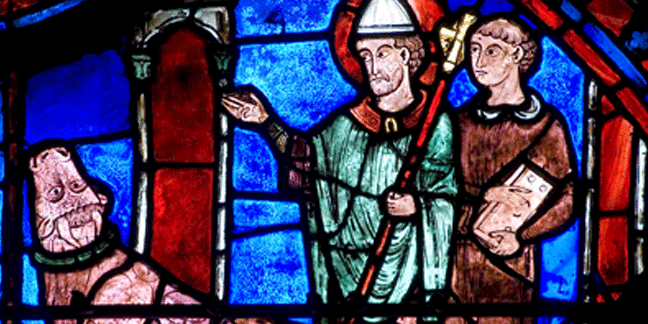 Pope St. Sylvester I was born in Rome around the year 250. At a young age, his mother put him under the care of a priest to be taught literature and theology. He was ordained a priest by Pope St. Marcellinus. His feast day is celebrated on Dec. 31.
Pope St. Sylvester I was born in Rome around the year 250. At a young age, his mother put him under the care of a priest to be taught literature and theology. He was ordained a priest by Pope St. Marcellinus. His feast day is celebrated on Dec. 31.
Sylvester enjoyed providing shelter to Christians passing through the city. He would take them with him, wash their feet, serve them at table and care for them, all in the name of Christ. One of the Christians whom Sylvester hosted was Timothy of Antioch, an illustrious confessor of the faith. When Timothy arrived in Rome, no one dared to receive him, but Sylvester considered it an honor. For a year, Timothy preached the Gospel in Rome with great zeal, while Sylvester selflessly shared his own home.
After Timothy was martyred, Sylvester buried his remains. He was quickly accused of having hidden the martyr's treasures, and the Roman governor had him imprisoned. In reply, Sylvester said, "Timothy left to me only the heritage of his faith and courage."
After the governor choked on a fish bone and died, the guards' hearts were softened and they set him free. Sylvester's courageous acts became known to Pope Miltiades (also called Melchiades), who elevated him to the diaconate.
Under the tyranny of the Roman emperor Diocletian, while Sylvester was still a young priest, the persecution of Christians grew worse, starting in 303. Diocletian murdered Christians, burned churches, searched homes to destroy sacred texts, and ordered everyone to worship idols placed throughout every Roman town or risk being killed. During this difficult time, Sylvester strengthened the faithful in Rome.
In 312 a new era set in. Constantine, having triumphed in battle under the "standard of the Cross," declared himself the protector of the Christians and established close ties with the Church. When Pope Miltiades died, Sylvester became pope on Jan. 31, 314 – making him the first of the Roman pontiffs to rule the flock of Christ in security and peace. He led the Church for 21 years until his death in 335, making him one of the longest-serving popes in history.
He is remembered in particular for his leadership through two heretical controversies in the Church – Donatism and Arianism – as well as the baptism of Constantine and the triumph of the Church over its former persecutors.
Donatists, led by the bishop Donatus, were extremist separatists in northern Africa who took a hardline view against Christians who had lapsed from the faith in order to save their lives during the brutal empire-wide persecution under Diocletian. In some cases, they beat Christians who had capitulated during Roman soldiers' searches of their houses; they took money in return for ordaining priests and deacons; and they "rebaptized" fallen Christians, sometimes by force.
A council convened by Constantine in 313 and the Council of Arles convened by Pope Sylvester in 314 both condemned the Donatists' actions.
Arianism, led by the Alexandrian Christian priest Arius, denied Jesus' divinity and equality with God. It taught that Jesus was not equal with God the Father and not eternal. In 325, Pope Sylvester convened the First Council of Nicaea, the first general Council of the Church, which reiterated Jesus' divinity and reaffirmed that Jesus was consubstantial with the Father – truly God and truly man.
A memorable but untrue legend from his pontificate involved Constantine, who was attacked by leprosy while he was still a pagan. One night St. Peter and St. Paul appeared to Constantine and commanded him to call for Pope Sylvester, who would cure him by giving him the sacrament of baptism. According to the legend, the pope baptized him, and Constantine was converted. (Actually, Constantine was baptized on his deathbed by someone else years later.)
During his pontificate were built the great churches founded in Rome by Constantine, including St. Peter's Basilica, the Basilica of the Holy Cross in Jerusalem, and the Basilica of St. John Lateran.
Pope Sylvester died on Dec. 31, 335, and was buried in the church he built over the Priscilla Catacombs. Interestingly, he is one of the earliest saints who was not a martyr.
— Sources: Catholic News Agency, The Catholic Encyclopedia
Pictured: This stained-glass panel in the St. Sylvester window inside Chartres Cathedral in France depict a legend from the life of Pope St. Sylvester. Before Constantine legalized Christianity in 313, he was considering the merits of Christianity versus Judaism. St. Sylvester suggested that the whole question of faith should be disputed before a collective audience of Jews and Christians, and the topics for discussion included paganism, God, Christ and the Ten Commandments. A leading rabbi named Zambri volunteered to perform a miracle as proof of his faith's superiority: he approached an ox and whispered "Jehovah" in its ear. The ox dropped dead. St. Sylvester responded by whispering "Christ" in the ox's ear, and the ox was restored to life. (photo courtesy of www.medievalart.org.uk)


